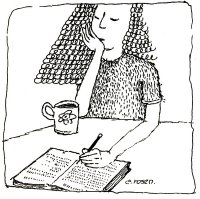by Gary McLarenDo you believe in ghosts?
They are mostly unseen. Unnoticeable. And believe it or not they are moving behind the scenes in the publishing industry. If you're lucky you might catch a fleeting glimpse. They are officially called 'ghostwriters'.
A ghostwriter is a writer who writes on an assigned topic under someone else's name, with their consent. They often write books completely from scratch but sometimes their work involves rewriting or polishing an existing work.
Most books by famous personalities are actually written by ghostwriters. When you see an autobiography or memoir from a politician, businessperson, or celebrity, chances are that it has been written by a ghostwriter.
Here are a few examples. The autobiography "Ronald Reagan: An American Life" was ghosted by Robert Lindsey. "Learning to Sing", the autobiography of American Idol star Clay Aiken, was written with ghostwriter Allison Glock. The autobiographies of Doris Day and Sophie Loren were written by A.E. Hotchner.
So how popular is ghostwriting? Statistics are hard to come by since many people don't want to reveal that their book is ghosted. Some industry estimates suggest that up to fifty percent of all non-fiction books are ghostwritten.
A client may decide to hire a ghostwriter because the client does not have any writing talent or because they are too busy. Ghostwriters, for their part, are usually well-established writers already, and are selected on that basis.
What do Ghostwriters Write? Ghostwriters are hired to write many types of documents, from autobiographies for famous personalities to e-books for internet marketing gurus, and even letters for politicians.
They also write fiction. Sometimes it is for a series of books written by several ghostwriters under one name, as with the stories of Nancy Drew or The Hardy Boys. Ghostwriters also continue to write novels under the name of popular authors who have died, as in the case of Robert Ludlum.
Is Ghostwriting Ethical? Although ghostwriting is a widely accepted practice within the publishing industry, some people outside of the industry complain that ghostwriting is deceptive. But that is not necessarily true. Consider for a moment the ghostwriting process. The client is the author of the work in that they are the person who is really behind the content. It is the client's ideas, the client's stories and experiences. It is the client's words recorded on hours of interview tapes. The ghostwriter is a professional consultant providing expertise in the area of bringing together all the information, organizing it, and writing it up in a way that will produce a marketable and readable masterpiece.
What Skills does a Ghostwriter Need? A ghostwriter must be a good writer.
He or she should also have good interviewing skills, since they will spend many hours and days interviewing clients. They should have the ability to ask good questions that will draw out the best aspects of a story.
Another skill - which may need to be developed - is the ability to maintain the client's voice so that the book reads like the client, not the ghostwriter.
How is a Ghostwriter Paid? Ghostwriters usually charge a flat fee for their work.
Sometimes they will reduce their ghostwriting fee in return for a percentage (perhaps 25-50%) of the royalties, or in rare cases they may waive their fee in return for a percentage of royalties.
The advantage of a flat fee is that a ghostwriter knows exactly how much he or she will be paid. The risk of relying on royalties is that even if the book is well-written, the ghostwriter has no control over the book's marketing and promotion.
Does a Ghostwriter get Any Credit? More often than not, the public never knows that a book was ghostwritten. Sometimes ghostwriters are even legally bound to not reveal that they have ghosted a particular book.
Occasionally ghostwriters will receive some credit. The writer's name may appear on the cover as a co-author or it might read "as told to Jenny Ghost." Another way to thank the ghostwriter is under the acknowledgements, for example "...and thanks to Joe Ghoul without whom this book would never have been completed".
Are You Thinking of Becoming a Ghostwriter? It could be an excellent career move. You've probably heard it said that everyone has a book inside them. Well, the fact of the matter is that not everyone has the time or the skill to write it.
As long as there is a story to be told, ghostwriters will continue to be in demand.
© Copyright 2006 Gary McLaren.
About The Author
Gary McLaren is the editor of Worldwide Freelance Writer, a leading source of information for freelance writers. If you would like more information on starting a ghostwriting business, check out http://www.worldwidefreelance.com/i/58.htm




